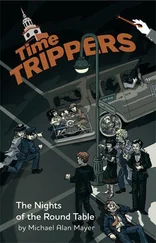“Entirely understandable,” declared the G.O.C. without hesitation. “It amounted to a case of self-defence, which takes the matter out of our hands.”
“Certainly, providing someone like Major Grau doesn’t try to put forward his own version of the story. It could, for instance, be painted as a piece of deliberate provocation which we tolerated almost without a murmur.”
“We needn’t worry on that account, my dear Kahlenberge. ” The G.O.C. beamed contentedly across the desk. “I did a little telephoning myself just now. As you’re aware"—here he winked confidentially—"I cherish the highest regard for Major Grau. His achievements on behalf of local counter-intelligence are beyond dispute. I have therefore impressed upon the appropriate authorities that Major Grau has an unrivalled claim to be transferred to a wider and more important sphere of duty.”
“And?” Kahlenberge inquired eagerly. “Have you really managed to get him kicked upstairs?”
“Major Grau is to be promoted lieutenant-colonel and will receive an immediate posting to the Abwehr in Paris. He is to be congratulated—and so are we.”
INTERIM REPORT
DOCUMENTS CONCLUDING THE FIRST PART OF THIS BOOK
Recorded remarks of ex-Sergeant Lehmann, long-time batman of General von Seydlitz-Gabler.
Place: Berlin.
Date: 17th February, 1962.
Lehmann on General von Seydlitz-Gabler, with special reference to his private life. Reproduced in heavily abridged form: “The General was one of the best, you can’t get away from that. A proper gentleman in any situation.
“Here’s a typical example. Just after the fall of France we were quartered in a villa somewhere. I came in late—saw a light still on in the General’s study—thought: he’s working himself to death. Then thought: maybe he needs something—a sandwich or a glass of soda water or a bottle of burgundy. Knocked and went in. Saw the General sitting there brooding in an arm-chair, medals and all. Then saw a woman stripped to the buff and doing a sort of dance in front of him. Nice bit of stuff. Said: ‘Excuse me, sir,’ and the General said: ‘I’m afraid you’re in the way for the moment, my dear Lehmann.’
“Do I remember Melanie Neumaier? I should say so. She was potty about the General. Not that she showed it of course, but I could read her like a book. She used to get hot pants whenever she’d been near him for any length of time. Once she led me on—me! We had a roll on the General’s bed—he was in conference at the time. She puffed like an engine going up a gradient and babbled: ‘Herbert, oh Herbert!’ My name’s Alfons—Herbert was the General’s Christian name.
“Frau Wilhelmine was a right one. She just about did for us, the way she kept us all on the hop. Sometimes I was almost as worn out as the General—and I didn’t have to sleep with her. But she was a real lady, I will say that. No one ever got a sniff there, not even the people she encouraged—not even Rainer Hartmann, I’d stake my oath. He just acted as a sort of lap-dog for a while—wagged his tail nicely too, but that’s as far as it went.
“Her ladyship always spoke to me in the third person. Something like this: ‘I’m sure our faithful Lehmann will take care that…’ or: ‘Seeing that our Lehmann is so reliable, I hope that he will…’ and so on.—Our Lehmann! It wasn’t long before everyone on the staff was calling me that. Even a girl who was keeping the General happy called me ‘our Lehmann.’ She had a point, too. The General wasn’t getting any younger, you see. Too much red wine and worrying about his work didn’t help—so, to cut a long story short, I helped him out occasionally.
“Things got a bit complicated sometimes. Once when I was waiting next door for the girl I heard her start screaming fit to bust and rushed in. The first thing I saw was what I expected to see—follow me? Then I saw that the girl was purple in the face—bloody near strangled, she was. The General must have had a sort of heart attack, because he was hanging on to her with his hands round her neck. Pathetic, isn’t it? That’s what comes of knocking yourself out for your country. And what thanks do you get, that’s what I’d like to know.”
Extract from a leading article published in the magazineSword and Spiritin November 1942.Its author was Captain Kahlert, the war historian attached to General von Seydlitz-Gabler’s staff. This article appeared under the title: “Resistance and the Consequences:”
“We are waging this war in order to create a better world. It is an historic mission of which no one who is conscious of his responsibility toward Greater Germany and a New Order in Europe can or may deprive us.
“But, as always occurs when light wrestles with darkness, the most sinister forces are unleashed. Sub-humans are incapable of observing the clearly defined rules of fair play. Their favourite weapons are cunning and deceit. We must not only be prepared for this but take positive measures to meet it, and this plainly entails the extermination of all criminal elements.
“Such is the situation that has been forced on us in several places, notably Warsaw. While we regret it profoundly, we should not hesitate for one moment to draw the necessary conclusions. For what are the real facts of the matter? Poland persistently provoked the German Reich and imposed a war on her by force of arms. We had no alternative but to meet this challenge, and we did so victoriously. We occupied the country and began to govern it according to the historic rights of the victor and the eternal laws of humanity.”
Statement by a man named Valentin Gebhardt. Gebhardt is not mentioned by name in the present book. The only reference to him is the short sentence which describes how a man standing beside General Tanz on the edge of Promenade Square in Warsaw was hit by a bullet and collapsed. Gebhardt, then a sergeant, was severely wounded. He belonged to the dispatch-rider section of between two and four men which had to accompany General Tanz everywhere in action: “The General never turned a hair, even under the heaviest fire. He never wore a steel helmet either. Some of the lads used to say he had an arrangement with the Devil and others said he just couldn’t care less. One of them even reckoned he wanted to die. But that was all bullshit. General Tanz had more guts than the rest of them put together.
“In the days when I knew him he was always in the thick of it with that sub-machine-gun of his, loosing off one magazine after the other. His belt was always stuffed with grenades and he had several pistols. One he always wore himself, the second he kept in the glove compartment of his car and the third had to be brought along in reserve by his orderly.
“Tanz was a crack shot. We used to say that if one of the enemy saw the whites of Tanz’s eyes it would be his last sight on earth. No quarter—that was his rule, and he stuck to it even when things started to go to pot.
“I was still with him then. That was during the first winter in Russia, just short of Leningrad. Tanz was going at the enemy hell for leather, as usual. Even the special shock troops couldn’t keep up with him, and my number two had to be replaced five times in seven days. It was a tough number, I can tell you. Then we suddenly found ourselves cut off. It took us two days and nights to fight our way out—partly with arms and ammunition taken from the Ivans. Nearly half the division bought it in the process. There were some companies which could hardly muster a platoon.
“I went out like a light when I stopped one that time in Warsaw, but when I came to there was a bottle of brandy by my bed. ‘With the General’s best wishes,’ the Sister told me. That was Tanz all over! And I was one of his best D. R. s.”
Читать дальше












